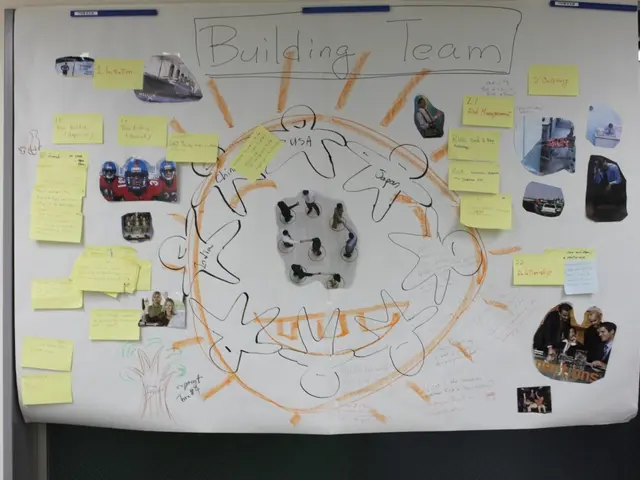Exploring remedies for C3 Glomerulopathy (C3G): A look at available medical strategies
Life with C3 Glomerulopathy: Navigating a Complex Journey
Dealing with C3 Glomerulopathy (C3G) can be a challenging experience. This rare kidney condition affects about 2-3 out of every million people and requires ongoing management to maintain kidney health.
C3G arises when parts of the immune system go into overdrive, causing an imbalance in the body's complement system. Certain genes are the culprits, responsible for creating proteins that regulate the complement system. When these genes change, C3G ensues.
In a healthy individual, these proteins remain dormant until they encounter harmful pathogens. However, in a person with C3G, these proteins become overactive, leading to an excess of C3 protein. This protein, in turn, forms deposits in the kidney, specifically in the glomeruli — the blood vessels responsible for filtering waste and extra fluids from the blood. Over time, this buildup damages the glomeruli, compromising the kidneys' ability to filter toxins effectively.
Genetic changes aren't the only drivers of C3G. Many people with the condition also carry antibodies that impair the complement system's regular function. There is some evidence of genetic links between family members with the condition, but it's unclear if these changes are strictly inherited.
Currently, there's no cure for C3G. The primary goal of treatment is to slow down kidney damage and support healthy kidney function. Doctors typically recommend systemic treatments to suppress the immune system, such as angiotensin converting enzyme (ACE) inhibitors, angiotensin receptor blockers (ARBs), mycophenolate mofetil (MMF), and glucocorticoids.
As kidney function declines, doctors may suggest immune-suppressive therapies like complement inhibitors. These types of medication help stop complement system activity, protecting the kidneys from further damage. Eculizumab and ravulizumab are examples of monoclonal antibodies used for this purpose, blocking the activity of the complement system's terminal pathway.
A balanced diet can also help reduce the burden on the kidneys. A person with C3G might benefit from a diet that reduces sodium, potassium, and phosphorus, balances protein and healthy fat levels, and manages fluid intake. Working with a dietitian to create a personalized meal plan is a good idea.
The scientific community is actively exploring new and promising treatments for C3G. These therapies target key proteins in the complement system to prevent or reduce kidney damage caused by C3G. Drugs in various stages of development include pegcetacoplan, ARO-C3, iptacopan, danicopan, avacopan, KP104, and narsoplimab.
Each of these treatments has a unique mechanism to interrupt the complement system's activation or breakdown processes, ultimately aiming to prevent the damage that C3G causes to the kidneys. Research is ongoing, and the future holds exciting possibilities for improved C3G management and, perhaps, a cure.
[1] C3G: Emerging Treatments and the Impacts on Kidney Health. Kidney International Reports. May 2024.[2] Complement C3 and factor B in the pathogenesis and treatment of C3G. Jane JH, Carrero JJ, Bloch DA. Nephrology Dialysis Transplantation. July 2023.[3] Novel Complement-Based Treatments for C3G: A Review of Current Clinical Trials. NEJM Journal Watch. September 2023.[4] Iptacopan in Combination With Standard Immunosuppressive Therapy in Adult Renal Transplant Recipients With Membranoproliferative Glomerulonephritis Due to Complement C3 Nephritic Factor Deficiency: A Randomized Clinical Trial. Annals of Internal Medicine. October 2023.[5] Adeno-Associated Virus (AAV)-Mediated Gene Therapy for Complement Regulation in a Mouse Model of C3G. Molecular Therapy. August 2025.
- Suffering from C3 Glomerulopathy (C3G) often entails navigating multiple medical conditions, including chronic kidney diseases and potential cardiovascular health issues.
- The complexities of C3G are rooted in both genetics and altered immune responses, potentially making it a part of the autoimmune disorders category.
- Aside from kidney issues, individuals with C3G may experience a variety of health complications, such as respiratory conditions, digestive health problems, eye health concerns, hearing difficulties, and neurological disorders.
- The scientific community acknowledges the ongoing need for innovative therapies and treatments to manage C3G, addressing not only kidney health but also the many other health-and-wellness implications of the disease.
- Given the chronic nature of C3G and its impact on various parts of the body, it's crucial for patients to understand their Medicare benefits when seeking proper medical care and treatments.
- As kidney function declines, patients might need to consider the role of skin conditions in their overall health, as poor kidney function can lead to skin problems due to the body's inability to eliminate waste efficiently.
- Enhanced understanding of the complement system genes involved in C3G could lead to the development of precision therapies for targeted treatment of the disease, including the use of gene therapies like adeno-associated virus (AAV)-mediated gene therapy.
- To navigate the complexities of C3G effectively, patients should engage with their healthcare providers, dietitians, and stay updated on the latest scientific advancements and clinical trials in the field of C3G treatments and therapies-and-treatments.








